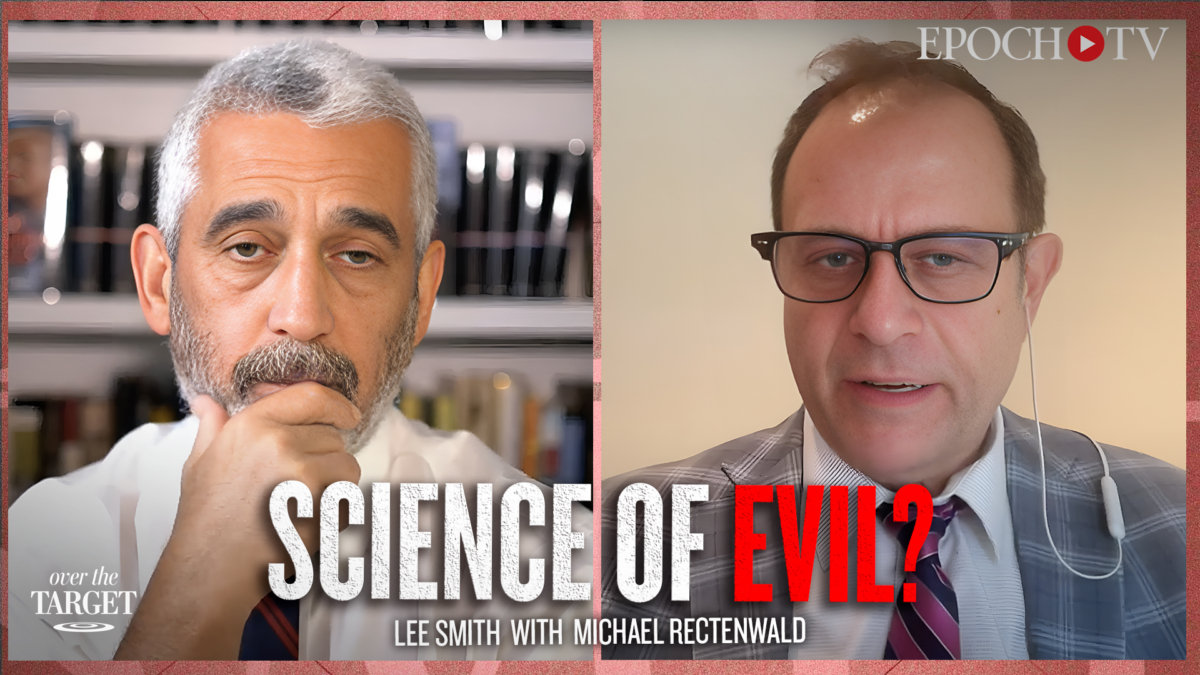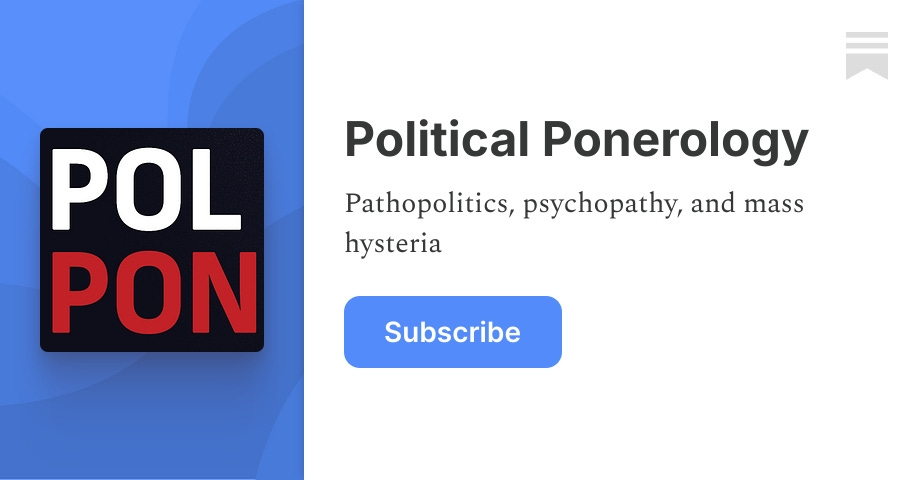Lee Smith: Welcome to "Over the Target." We have a really terrific show this morning, a very special show. I started reading a book, this book was reissued. This particular edition was reissued in 2022 by a brilliant Polish psychiatrist, Andrzej Łobaczewski, who passed away in 2007. This book was the only book he published, and actually, it was the amalgamation of work that he had done with other researchers behind the then Cold War era, the Iron Curtain, about the origins of evil. How do evil regimes come to be? And I started reading this book, it was recommended to me by a friend. I started reading it, and I just got so captivated by it, and I found that the introduction was written by a friend of Over the Target, Michael Rectenwald, who has been with us before, spoken with us before. So I was just so keen to speak to Michael about this and get his insight into it, and I think you're really going to find this very interesting. It's a really compelling book, a very strange book, but quite brilliant. So without me continuing to ramble on, let's get right into a conversation about the book with our friend Michael Rectenwald. Michael welcome.
Michael Rectenwald: Okay. Thanks for having me, Lee. Good to be here.
Lee: Hey, I also wanted to remind viewers we've talked about Michael's great book here: The Great Reset. I just wanted to put it out there before. The Great Reset and the Struggle for Liberty. Unraveling the global agenda, Michael Rectenwald. Great book. Michael, I see it's getting great reviews, great attention, well deserved. Congratulations again on the book.
Michael: Thanks so much, I appreciate that. That's going pretty well, and I've been giving talks all around, on the topic.
Lee: Political Ponerology. I'd been reading it online. There are a few drafts online, but then I got the real edition of Political Poneurology by Andrzej Łobaczewski, and I saw that you'd done an introduction, so I was so keen to talk to you about it. And again, I'm so grateful that you're here to talk about it. Can you tell me what got your interest in this book? I want to talk about your introduction, and I want to talk about your insight, and I want to talk about Łobaczewski's insight, but what was it that got you interested in Political Ponerology?
Michael: Political Ponerology is... Ponerology can be translated as the study or science of evil. So the term ponerology comes from the Greek poneros, which means inbred evil that is easily spread. That's effectively what it means. So, the book is about the spread of evil, and what got me interested in this book is, of course, having had a run-in with the leftist authoritarians at NYU. I started to research, of course, the leftist authoritarian mindset. This took me, of course, into studies of political ideology and economics, including The Black Cook of Communism, and the Stalinist Digital Archive, and other sources that tried to give me; I was trying to get clued into what is the nature of leftist authoritarianism/totalitarianism. And then I came across this book, Political Ponerology, which came up in the context of a workshop in which the editor Harrison Koehli was a member, and this struck me as extremely interesting in the sense that it was the only book that suggested that it understood the origins of totalitarianism. And it didn't see it as coming from ideology or economics, which was entirely new to me because I had thought: if you understand the ideology and the economics, you understand totalitarianism. And he says something quite different than that, and it struck me as, 'Wow!, this, if it's right, and if it is, you know, telling, then we have one of the most important books in the world on our hands.
Lee: We look at totalitarianism, Nazism, we look at the Chinese Communist party, Stalinism, Leninism, we look at these through a historical lens, we look at in terms of economics, but we don't look at it the way that Political Ponerology does. So if you can... what is it? How does he explain... I believe he says that he has something like the formula for explaining the origins of evil. And, what is it?
Michael: Well, I would call it a psychologistic approach, that approaches the whole origin of evil from the perspective of individual psychology. And it suggests that pathocracy, which is ruled by pathocrats, or psychopaths. It starts from the psychopaths themselves and is spread throughout society by psychopaths. It begins with, as he puts it in the book, schizoid personalities who write these treatises that then become attractive to other people, which he calls characteropaths. And they spread the ideology. There's something wrong with the ideology from the beginning, but then it gets into the hands of psychopaths who take over on the basis of this ideology. So it is ideological, but he does a critique of ideological analysis itself, which is part of this book.
Lee: I come at it largely from, you know, from literature, so we have Solyenitzin who talks about, you know, what is evil. He says, 'Well, if it was just so easy to say these people are good, and these are those, these really evil people are responsible for doing these really bad things, and we have to stop them,' he said. But it's not that easy, the line between good and evil cuts through the middle of every human heart, he phrases something like that, and it appears that Łobaczewski and his colleagues, I think of them as fellow ponerologists, they're saying, 'no, wait a minute, there are evil people in the world, and if you don't recognize this, this causes untold suffering.' And so you know, we should talk a little bit about his biography.
Łobaczewski was born in 1921. He lived through the Nazi occupation of Poland. And then, of course, communism in Poland. So he saw these pathologies and how they affected the people around him. He himself, I believe, was arrested and tortured three times before he moved to the U.S., something like that. But when you read this, you're like, 'well, wait a minute, of course, this makes total sense. Those pathological regimes would be the function of pathological people'. Right? Is that what you take to be the fundamental argument here?
Michael: The fundamental argument, I think, is that in fact... that totalitarianism is a pathocracy, a rule by pathocraths. And that pathograths are effectively psychopaths. And that we can understand this beginning with an individualistic basis, which is very different from the way I've studied history and the way I've studied ideology, which is always conceived in some collective sense. And here we have a methodological individualism, if you will, which focuses on individuals primarily, and shows how individual pathologies spread throughout the social body, and then take over the social order.
So the origin of evil is coming out of the individual, so this is a very important discrimination that he makes, a very important point that he's drawing here our attention to, individuals as opposed to looking strictly at a collective essence. And we should like that since we're not collectivists, I take it.
Lee: Right, well, this goes back to... I mean, isn't this part of an older argument in history as well? I remember, many years ago, I read the Sydney Hook volume, The Great Man in History, so there are sort of competing theories, right? You have some theories that say: 'Well, what really moves history is the great men in history,' but some of them for better and some of them for worse. We have Napoleon, Stalin, Mao. And the other argument is like, 'No, it's more structural than that. This is what's responsible for these huge shifts in history. It's systemic.' Right? Structural, it's not about a great men. So Łobaczewski comes down very clearly, it seems to me, on the idea that, no, there's there are actual... it might not always be one person, but there are actual human beings who are doing this, this is not about structures it's about a person, people.
Michael: This is... that's exactly right, and this great man's theory of history, of course, comes from Thomas Carlisle, the 19th century romantic, late romantic writer. But anyway, the idea here is that, in fact, you know, this structuralist, or systemic analysis, misses the point and misses the origins of evil. We can trace this to particular pathologies that begin... in the case of psychopaths, he believes, they're genetic. In the case of what he calls characteropaths, he calls it organic, it comes through maybe some sort of environmental damage, and then in the case of what he calls sociopaths, effectively, it comes from environmental influences like parents and so forth. But in any case, all of this combined, these pieces work together, these individuals, and then they spread this ideology.
An interesting thing about the ideology is that there are two sides to ideology in this analysis, that one side says taking that face value, like: 'Workers of the world unite, you have nothing to lose but your chains,' you know, 'we're looking for economic equality,' 'we're looking for diversity equity and inclusion,' to put it in modern parlance. All of these are the outward-facing meanings of the term, but for the psychopaths, they have a different meaning, that they ascribe to the exact same language, and this is where this idea of double speak comes from. You think that they're talking about what they seem to be talking about, but what they patently suggest they're talking about, but really they have something else in mind, and only the Insiders know what that is.
Lee: Right. This is fascinating because it also explains something that we see happen all the time, I mean, I think that some of the most famous examples were with the Khmer Rouge, right? What we saw... the True Believers are always the first ones, historically. True Believers are usually the first ones to be executed by the regime because the people who are actually in charge are not True Believers, they're psychopaths, right? They're the Psychopaths. There's the top psychopath called the Spellbinder, and then, there are the other psychopaths who recognize in him an opportunity to satisfy their own bloody fantasies, and that's really the core of the regime, the psychopath, not the True Believers.
Michael: The True Believers are expendable. In fact, they have to be eliminated because they hold the ideal up against reality and that ideal must be banished because they can't have these people saying: 'No, what you said was we'd have economic equality, not ruled by a few Party leaders who live in lavish wealth.' 'You also said that this was for all the people, and you put all dissenters into prison, and you assassinate people arbitrarily on political grounds.' 'We can't have people holding that ideal up against reality, so they must be eliminated.' The useful idiots, as they were called by Stalin.
Lee: Right. 'We didn't mind you killing, we supported, and we helped when you killed our enemies, the bourgeoisie, the whatever; however we want to describe them, but once you turn your arms on us and our comrades who helped win the revolution, now, what's going on here.' It's like... Well, they're psychopaths, is what they are.
Michael, we got to take a quick break, we're going away for less than a minute. For anyone who's watching on YouTube or Facebook, make the jump, because when we come back, I want to ask Michael a big question: how does this apply to where we are right now in the United States? Are we looking at the growth of a pathocracy? So how much does political ponerology help us understand where we are right now? But, right now, if you're watching on YouTube or Facebook, make sure to make the jump exclusively to Epoch TV very quickly. We'll see you in less than a minute, make sure you make the jump and join us again.
[Dave Chapelle: He said: I know the system is rigged because I use it.
Lee: Trump is expressing something that a lot of people across the country have been feeling for a long time.
Trump: The corrupt political establishment is a machine, it has no soul.
"It's very easy to see how the media, for one, wants to typify Trump supporters.
Trump said he could shoot someone...
Trying to shape Trump as a white nationalist, and the only people who could possibly support Donald Trump are white nationalists. He put on Instagram an altered image of Trump to make Trump look black, and said: "Free my n-word Trump."]

 www.theepochtimes.com
www.theepochtimes.com

 www.theepochtimes.com
www.theepochtimes.com






